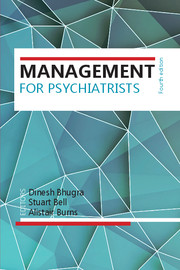Book contents
- Frontmatter
- Contents
- List of contributors
- List of figures, tables and boxes
- Preface
- Part I Theoretical overview
- Part II Changes and conflicts
- Part III Personal development
- 26 Compassionate care: leading and caring for staff of mental health services and the moral architecture of healthcare organisations
- 27 How to manage committees: running effective meetings
- 28 Presentation skills
- 29 Time management
- 30 Developing effective leaders in the National Health Service
- 31 Mental health informatics
- 32 Stress, burnout and engagement in mental health services
- 33 How to get the job you really want
- 34 Surviving as a junior consultant: hit the ground walking
- 35 Working with the media – many benefits but some risks
- 36 Consultant mentoring and mentoring consultants
- Index
35 - Working with the media – many benefits but some risks
from Part III - Personal development
Published online by Cambridge University Press: 02 January 2018
- Frontmatter
- Contents
- List of contributors
- List of figures, tables and boxes
- Preface
- Part I Theoretical overview
- Part II Changes and conflicts
- Part III Personal development
- 26 Compassionate care: leading and caring for staff of mental health services and the moral architecture of healthcare organisations
- 27 How to manage committees: running effective meetings
- 28 Presentation skills
- 29 Time management
- 30 Developing effective leaders in the National Health Service
- 31 Mental health informatics
- 32 Stress, burnout and engagement in mental health services
- 33 How to get the job you really want
- 34 Surviving as a junior consultant: hit the ground walking
- 35 Working with the media – many benefits but some risks
- 36 Consultant mentoring and mentoring consultants
- Index
Summary
The importance of public education about psychiatric Illness
Misunderstandings about the nature of mental disorder, its origins and consequences, and its prevention and treatment are widespread among our patients, their carers, our colleagues and the general public. Reducing ignorance and misgivings about psychiatric illness, and tackling unhelpful and discriminatory attitudes towards people with mental health problems, are important parts of the workload of all psychiatrists.
The Royal College of Psychiatrists actively engages with all forms of national and local media, using the expertise and goodwill of health professionals and patient organisations in liaising with journalists and broadcasters in efforts to improve the situation of people with mental health problems, and to reduce the stigma that is still so damagingly associated with mental disorder. This is achieved through:
• the College Media Centre, which supports the College's divisional public education officers and media spokespersons by providing them with detailed information about particular mental health problems
• the activities of the Public Education Committee, including the development and publication of books, factsheets and web-based resources
• a series of public education campaigns, such as ‘Defeat Depression’, ‘Changing Minds’, ‘Partners in Care’ and ‘Fair Deal’.
The College's Public Education Handbook (2013): Practical Advice on Working with the Media includes much helpful advice on the benefits and risks of media engagement (available on the College website).
For psychiatrists interested in improving public understanding of mental illness, the College has the experience and resources needed to optimise the impact of educational activity, although many psychiatrists might wish to undertake this role locally, working in collaboration with university or NHS trust press offices and local patient support groups. Many other organisations also work to confront stigma and to provide accurate information to the media about the nature of mental health problems and their treatment.
Are you the right person for the job?
This is a simple question. We all want to do our bit to increase public understanding and reduce stigma, but there is a world of difference between undertaking these roles within the setting of clinical practice and attempting to address these matters through liaison with local, regional and national media. Reflect on whether you have the necessary communication skills, time and personal resources to undertake an additional role in public education.
- Type
- Chapter
- Information
- Management for Psychiatrists , pp. 494 - 502Publisher: Royal College of PsychiatristsPrint publication year: 2016



